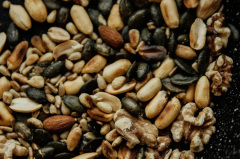Nature provides us with an array of powerful allies for supporting our inner and outer health. When it comes to skincare, one of the most potent is vitamin E due to its remarkable antioxidant, anti-inflammatory and collagen-promoting properties. Vitamin E can be obtained through food, applied topically and taken as an oral supplement for its skin and health benefits.
What is vitamin E?
Vitamin E is a group of eight fat-soluble compounds that include four tocopherols and four tocotrienols. Among these, alpha-tocopherol is the most biologically active form and is commonly found in dietary supplements and skincare products. As an antioxidant, vitamin E protects cell membranes from oxidative damage by neutralising free radicals, which are unstable molecules that can harm cells and contribute to aging and various diseases.
Sources of vitamin E
Vitamin E is abundant in various foods, making it relatively easy to incorporate into a balanced diet. Rich dietary sources include:
Nuts and seeds: Almonds, sunflower seeds and hazelnuts are excellent sources.
Vegetable oils: Wheat germ oil and sunflower oil are particularly high in vitamin E. It is best to eat these in their raw form, applied to salads rather than heating them, which changes their chemical structure.
Green leafy vegetables: Spinach, kale and Swiss chard provide a good dose of this vitamin.
Fruits: Avocados and mangoes are delicious sources.
In addition to dietary sources, vitamin E is available in supplement form and is a common ingredient in topical skincare products.
The benefits of vitamin E
The benefits of vitamin E extend beyond its antioxidant properties. Here are some key advantages:
Skin health and healing: Vitamin E is renowned for its skin-healing properties. It supports cell regeneration, which is crucial for healing scars, burns and other skin injuries. Its anti-inflammatory properties also help to soothe irritated skin.
Anti-ageing: By neutralising free radicals, vitamin E helps to prevent the oxidative stress that leads to premature aging. Regular use can reduce the appearance of fine lines and wrinkles, giving the skin a more youthful appearance.
Moisturising: Vitamin E is an excellent moisturiser. It strengthens the skin’s natural barrier, helping to retain moisture and keep the skin hydrated.
Sun protection and repair: While not a substitute for sunscreen, vitamin E can provide some protection against UV damage. It also aids in repairing skin damaged by UV exposure, making it a valuable addition to after-sun care products.
Therapeutic uses of vitamin E for the skin
Topical application: Vita





